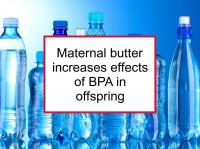Butter fat consumption and exposure to bisphenol A (BPA) both have been linked to increased breast cancer risk. Butter consumption during adolescence is associated with higher breast cancer risk in adulthood. The use of butter in soups or sauces, for frying food, and at the dinner table all have been linked to higher risk of breast cancer.
High intake of full-fat dairy products such as milk and cheese was found to be a significant factor for heightened breast cancer risk among Iranian women in one study. Butter, ghee, full-fat cheeses (cheddar, Swiss), and heavy cream are the most abundant sources of butter fat. Half and half, ice cream, and whole milk are also significant sources.
The endocrine disruptor BPA is one of the highest-volume chemicals produced worldwide; it can be detected in the body fluids of more than 90% of the human population. BPA is a common industrial chemical that leaches from food containers during normal usage, which leads to human exposure.
Butter heightens BPA's impact on rat pup mammary glands
The study referenced at the beginning of this news story was designed to investigate the potentially additive effects of concurrent gestational exposure to butter fat and BPA on mammary tumor risk in a rat model of breast cancer. To conduct the study, the authors exposed Sprague Dawley rats to various doses of BPA (2.5-2500μg per kg body weight) along with a high butter-based diet from before conception to birth. Another set of rats were exposed only to the butter diet.
BPA-induced tumor incidence and number of mammary gland terminal end buds were found to increase in the presence of the butter diet. Both results peaked at a dosage of 25μg/kg body weight BPA (among the lowest dosages studied). The authors also analyzed the expression of genes in mammary tissue samples of both the BPA (25ug/kg BW) group and the butter diet alone group. This examination determined that two specific cancer networks (involving extracellular-signal-related kinase (ERK) and androgen receptor (AR) signaling) were dysregulated, apparently through DNA methylation. These results suggest changes in gene expression during early development that predispose cancer risk.
The authors conclude that BPA predisposes mammary glands in early development to higher cancer risk by dysregulating gene expression in the presence of the butter diet, potentially facilitating cancer development in adulthood.
Please see our articles on BPA and the prenatal period and infancy for more information.
